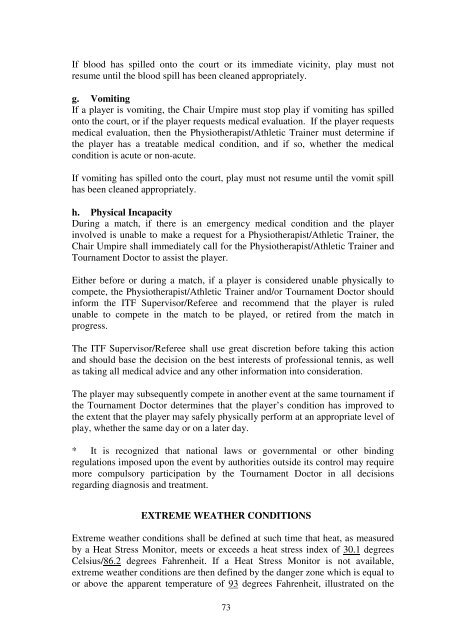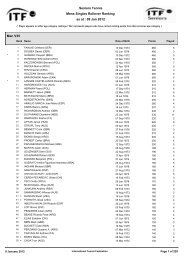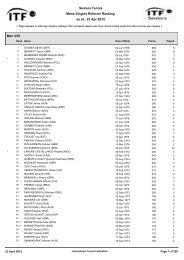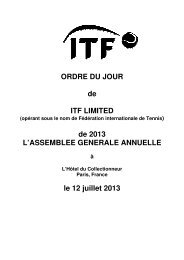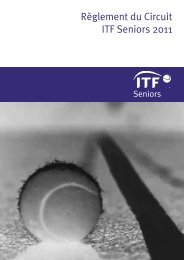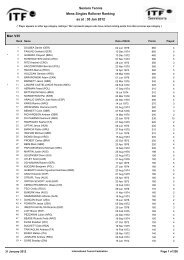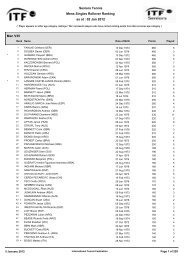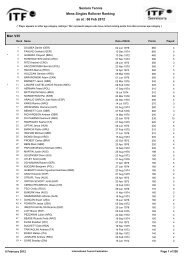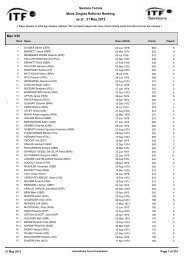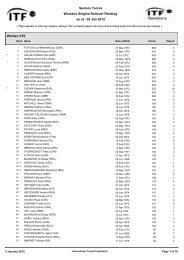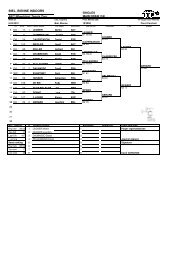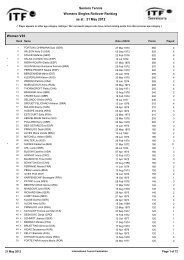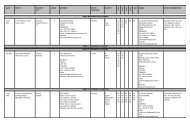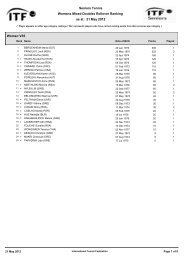Pro Circuit Rulebook 2011 - ITF
Pro Circuit Rulebook 2011 - ITF
Pro Circuit Rulebook 2011 - ITF
You also want an ePaper? Increase the reach of your titles
YUMPU automatically turns print PDFs into web optimized ePapers that Google loves.
If blood has spilled onto the court or its immediate vicinity, play must not<br />
resume until the blood spill has been cleaned appropriately.<br />
g. Vomiting<br />
If a player is vomiting, the Chair Umpire must stop play if vomiting has spilled<br />
onto the court, or if the player requests medical evaluation. If the player requests<br />
medical evaluation, then the Physiotherapist/Athletic Trainer must determine if<br />
the player has a treatable medical condition, and if so, whether the medical<br />
condition is acute or non-acute.<br />
If vomiting has spilled onto the court, play must not resume until the vomit spill<br />
has been cleaned appropriately.<br />
h. Physical Incapacity<br />
During a match, if there is an emergency medical condition and the player<br />
involved is unable to make a request for a Physiotherapist/Athletic Trainer, the<br />
Chair Umpire shall immediately call for the Physiotherapist/Athletic Trainer and<br />
Tournament Doctor to assist the player.<br />
Either before or during a match, if a player is considered unable physically to<br />
compete, the Physiotherapist/Athletic Trainer and/or Tournament Doctor should<br />
inform the <strong>ITF</strong> Supervisor/Referee and recommend that the player is ruled<br />
unable to compete in the match to be played, or retired from the match in<br />
progress.<br />
The <strong>ITF</strong> Supervisor/Referee shall use great discretion before taking this action<br />
and should base the decision on the best interests of professional tennis, as well<br />
as taking all medical advice and any other information into consideration.<br />
The player may subsequently compete in another event at the same tournament if<br />
the Tournament Doctor determines that the player’s condition has improved to<br />
the extent that the player may safely physically perform at an appropriate level of<br />
play, whether the same day or on a later day.<br />
* It is recognized that national laws or governmental or other binding<br />
regulations imposed upon the event by authorities outside its control may require<br />
more compulsory participation by the Tournament Doctor in all decisions<br />
regarding diagnosis and treatment.<br />
EXTREME WEATHER CONDITIONS<br />
Extreme weather conditions shall be defined at such time that heat, as measured<br />
by a Heat Stress Monitor, meets or exceeds a heat stress index of 30.1 degrees<br />
Celsius/86.2 degrees Fahrenheit. If a Heat Stress Monitor is not available,<br />
extreme weather conditions are then defined by the danger zone which is equal to<br />
or above the apparent temperature of 93 degrees Fahrenheit, illustrated on the<br />
73


